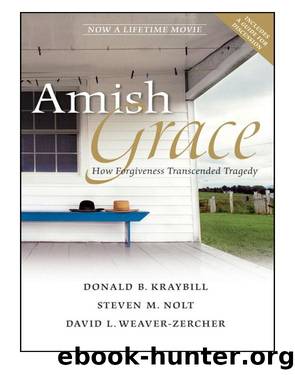Amish Grace by Donald B. Kraybill & Nolt Steven M. & Weaver-Zercher David L

Author:Donald B. Kraybill & Nolt, Steven M. & Weaver-Zercher, David L.
Language: eng
Format: epub
Publisher: John Wiley & Sons, Ltd.
Published: 2010-03-07T16:00:00+00:00
Amish Anger?
It hardly makes sense to talk about forgiveness unless anger or other negative emotions arise from an offense. Did the Amish feel anger toward Charles Roberts? Did they feel anger toward his family and friends? Some commentaries implied that they did not. “I would not want to be like them, reacting to terrible crimes with dispassion,” wrote Jeff Jacoby of the Boston Globe. “How many of us would really want to live in a society in which no one gets angry when children are slaughtered?”
Jacoby’s critique was more spirited than most, but it was not unique. Moreover, he did not make up this notion of a mild Amish response. On Wednesday morning, two days after the shooting, a Mennonite nurse-midwife close to some of the grieving families told NBC’s Today Show that one of the slain girls’ mothers had already forgiven Roberts. “She holds no ill will toward the shooter,” reported Rita Rhoads. “Even last night [Tuesday night] there was no anger toward the shooter.” An Amish woman living in Georgetown said, “I just shiver when I think what would have happened if we had been angry at the firehouse, the funerals, or the burials. It was not a choice we made at the time to not be angry. The emotions of deep hurt and sadness along with the tears of grief snuffed out the feelings of anger. Love was something I felt a lot more than anger.”
Is it possible that some of the families most affected by the shooting felt absolutely no anger? Some of our interviews suggest that this may have been the case. “There was never a time that I felt angry,” the father of one slain girl told us. “It’s been a very hard experience, but I don’t hold any hard feelings against anyone, not against the killer or anybody in his family.” Citing a newspaper article he read about a non-Amish family that “spouted hateful things” for years after a family member’s murder, this grieving parent concluded that “anger helps no one and simply makes the bearer of the anger feel worse.”
In other interviews we did hear Amish people admit to angry feelings at the time of the shooting and in the months that followed. Typically, however, the killer was not identified as the target of the rage. Sylvia, for instance, spoke of the anger she felt when she attended the viewing for Naomi Rose, the youngest victim. “She was just so beautiful. It really made me angry. I wasn’t angry at Charles; I was mad that she was dead, just mad at the evil.” Her husband concurred: “I am angry at the evil and at how much suffering the evil caused because of sin.” The couple went on to tell of a time, several months after the shooting, when the father got mad at his son for failing to clean up some tools in the shop. “You were really angry,” said his wife, “and I think it was because of October 2nd.” In
Download
This site does not store any files on its server. We only index and link to content provided by other sites. Please contact the content providers to delete copyright contents if any and email us, we'll remove relevant links or contents immediately.
Fearfully and Wonderfully Made by Philip Yancey & Paul Brand(588)
Christian Ethics by Wilkens Steve;(571)
Numbers by Ronald B. Allen(503)
The World from 1450 To 1700 by Wills John E.;(499)
Christian Ethics: An Introduction to Biblical Moral Reasoning by Wayne Grudem(478)
How to Read Slowly by James W. Sire(458)
God and the Multiverse by Victor J. Stenger(447)
Morality by Jonathan Sacks(431)
Monastic Archaeology by Unknown(408)
The Disabled Church by Rebecca F. Spurrier;(396)
Jesus: A New Vision by Whitley Strieber(370)
Critical Writings by Joyce James;(366)
Death of the Doctor by Unknown(366)
Redeeming Sociology by Vern S. Poythress(364)
Amish Grace by Donald B. Kraybill & Nolt Steven M. & Weaver-Zercher David L(362)
The Technological System by Jacques Ellul(352)
Children of Lucifer; The Origins of Modern Religious Satanism by Ruben van Luijk(352)
The Catholic Case for Trump by Austin Ruse(334)
The Church in the Early Middle Ages by G.R. Evans(332)
